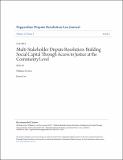| dc.description.abstract |
Systems of multi-stakeholder dispute resolution are increasingly recognized as objectives of good governance by international organizations such as the United Nations Development Program (UNDP). Such objectives arise out of insights based on the dynamics of social capital that community based initiatives cannot succeed where trust is absent and mechanisms for collective decision-making do not exist. Yet localized decision-making can take many forms—whether distributional, competitive, or collaborative. This paper will examine, in particular, the impact of collaborative systems of decision-making on building social capital through access to justice in local communities . It will do this through examining participant feedback, meeting minutes, and post-consultation reports of a community multi-stakeholder dialogue process in Cajamarca, Peru. The creation of dispute resolution forums where community members can actively participate in the generation of shared objectives, collect and access information, and take action on issues of collective concern represents an important foundation for the development of social capital. |

